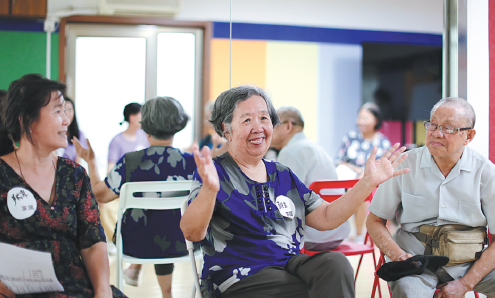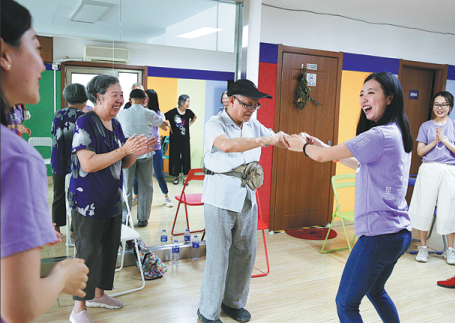

Eighty-year-old Li Xinsheng clearly remembers the day her husband was diagnosed with Alzheimer's. "It was March 4, 2019," the retired teacher recalls. "We ate fish at a restaurant, and he suggested taking one to go. When we got home 15 minutes later, he asked me what was in the takeout box and where I got it from. When I told him, he looked blankly at the box and said he had no recollection.
"I was shocked. I realized it was a symptom of an illness rather than the memory loss common to aging. The next day, I took him to the hospital for testing. He was diagnosed with early-stage Alzheimer's."
She says it's lucky she reacted quickly and took her husband to the hospital right away. Since then, she has done everything she can to slow the ailment's progression.
The couple recently attended the dance-therapy program, Time to Dance. The program initiated by the Scottish Ballet from the United Kingdom in 2017 offers dance classes for people living with dementia and their caregivers.
The Chinese edition was launched by the Beijing-based cultural organization Body On&On in July and ran through September. Due to COVID, sessions were held both online and in person.
Nine families met with one another for the Sept 2 in-person workshop. The session began with self introductions. Then, under the guidance of two professional dancers, the participants did warmup exercises, learned a series of dance moves and were encouraged to improvise their own.

Both participants and instructors were referred to simply as "dancers".The dancers interacted with one another to well-known classic tunes in a relaxing atmosphere. Some participants started singing along with the songs as they danced.
At the end of 2020, Body On&On and the Scottish Ballet began to discuss the possibility of launching a Chinese edition of the project with the support of the British Council. The Beijing organization then recruited a group of Chinese artists with diverse backgrounds and relevant qualifications to receive online training from the ballet company.
Dance choreographer and teacher Li Rumeng, who's one of the workshop instructors, has long been involved in dance therapy and also participated because her grandmother has early-onset Alzheimer's.
"It worried me when I spent time with my grandma and realized her condition was deteriorating," Li Rumeng says.
"It revealed to me the inexpressible pressure faced by families with members who experience Alzheimer's disease. I want to help them alleviate the constant feeling of dejection with my meager contribution."